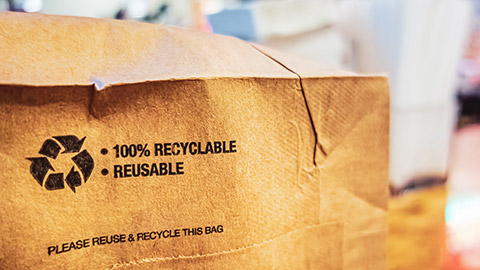Welcome to Topic 11: Doing Well by Doing Good. In this topic you will learn about:
- Sustainable marketing
- Refraining from doing harm
- Doing good by advancing social responsibility
- Why do good?
Marketing has traditionally been seen as a business function to generate more sales and demand, getting people to buy more and more frequently. Just look at shopping events such as Black Friday or advertisements to entice consumers to spend. This is in direct contradiction to sustainable behaviours that have increasingly been prioritised due to changing societal values. Are profitability and sustainability or social responsibility mutually exclusive? Can companies do well by doing good?
These relate to the Subject Learning Outcomes:
- Demonstrate an understanding of the importance in business practice of market orientation.
- Evaluate market conditions and consumer needs when forming marketing strategies.
Welcome to your pre-seminar learning tasks for this week. Please ensure you complete these prior to attending your scheduled seminar with your lecturer.
Click on each of the following headings to read more about what is required for each of your pre-seminar learning tasks.
Read Chapter 20 of Kotler, P & Armstrong, G 2021, Principles of Marketing Global Edition, 18th edn., Pearson.
Read the following journal articles:
- Jones, P, Comfort, D & Hillier, D 2018, ‘Common ground: The sustainable development goals and the marketing and advertising industry’, Journal of Public Affairs, 18(2).
- Amoako, GK, Dzogbenuku, RK, Doe, J & Adjaison, GK 2020, ‘Green marketing and the SDGs: emerging market perspective’, Marketing Intelligence & Planning (published online ahead of print 17 August).
Read the following web articles and industry reports:
- Rodríguez-Vilá, O & Bharadwaj, S 2017, Competing on social purpose, Harvard Business Review
- Smith, K 2016, The complete guide to cause marketing, Brandwatch
- 2030 Builders, Use the SDGs to bring value to your marketing and sales communication
- Cameron, N 2021, How brands can respond to cancel culture in 2021, CMO
Read the case study, ‘H&M: Offering Sustainable Fashion and Quality at the Best Price’ on p. 606 of the prescribed text.
Read and watch the topic content.
There are discussion forum activities for this topic, which will enhance your knowledge and give you the opportunity to interact with your peers. You can access the activities by clicking on the following links. You can also navigate to the forum by clicking on 'MKT100 Subject Forum' in the navigation bar for this subject.
- Topic 11: Forum Activity 1 - Reflection
- Topic 11: Forum Activity 2 - Case Study

Sustainable marketing
We introduced the notion of a societal marketing concept in our very first topic which is a marketing philosophy that considers society’s well-being as an important aspect of satisfying customers’ needs and wants. This is fuelled in part by the changing macro-environment of what society deems important and the rise of the conscious consumer.
Sustainable marketing achieves this by implementing “socially and environmentally responsible actions that meet the present needs of consumers and businesses while also preserving or enhancing the ability of future generations to meet their needs” (Kotler & Armstrong 2021, p. 582).
There is this concept of Corporate Social Responsibility (CSR) where corporations are regarded “to have a degree of responsibility not only for the economic consequences of their activities, but also for the social and environmental implications” (Australian Human Rights Commission 2008). This is also referred to as the triple bottom line, which specifies that companies should stop focusing solely on profits and expand their focus to include social (people) and environmental (planet) responsibilities in measuring their success (Kenton 2021).
Creating and capturing value has always been the cornerstone of marketing, but now this is shifted to the principle of shared value which is carrying out activities to create economic value while simultaneously creating societal value by addressing the challenges faced by society (Porter & Kramer 2011). The following video explains how societal challenges can be opportunities rather than threats for companies by creating shared value.
Refraining from doing harm
The first step to doing good is to avoid doing harm. CSR can be reimagined in a pyramid, ranking a company’s economic, legal, ethical, and philanthropic responsibilities into requirements, expectations and desirables. For example, a company is required to comply with the laws and regulations where they operate and is expected to act ethically at all times (Carroll 2016).
- Philanthropic responsibilities: be a good corporate citizen.
- Ethical responsibilities: do what is just and fair and avoid harm.
- Legal responsibilities: obey laws and regulations.
- Economic responsibilities: be profitable.
Deceptive business practices
A good practice for businesses to avoid potentially deceptive and illegal practices is to closely examine all aspects of their marketing mix. . Here are examples of some questions that you can consider:
- Product: Is the product safe for use or consumption?
- Price: Is the price as advertised or is it misleading?
- Promotion: Are the claims or messages true and can it be substantiated?
- Place: Do wholesalers and retailers deliver on the expectations set for product, price and promotion?
Activity
When you purchase goods or services from businesses in Australia, you are protected under the Australian Consumer Law which sets out your rights and guarantees as a consumer. This includes the right to a refund and getting accurate information about a product. Record your findings in your reflective journal.
Explore the Australian Competition & Consumer Commission [ACCC] website to find out about consumer rights and protections.
Ethical behaviour
Ethics discern the rights from the wrongs but the concept of 'right' and 'wrong' is rather subjective. In a marketing context, ethics is about “promoting fairness, honesty and empathy in all marketing activities” (Forsey 2020). For conscientious marketers, making ethical decisions are challenging because it is not always black and white and they often face moral dilemmas (Kotler & Armstrong 2021). Something that is totally legal may not be ethical at all!
Have a quick search on United Express Flight 3411 and you will see a number of articles covering the incident of a passenger being dragged off an overbooked flight. While the practice of overbooking flights is legal and even very common among airlines, many felt that United Airlines did not handle the situation well.
Activity
What would you do when faced with ethical or moral dilemmas? Play the following simulation to see how different decisions you make can lead to different outcomes.
Doing good by advancing social responsibility

More and more companies are going beyond the bare minimum of not doing any harm. They are actively pursuing social and environmental initiatives that can make a difference in societies. They also often publish sustainability or CSR reports to demonstrate their commitment to sustainability and communicate how they are implementing sustainability into their respective businesses.
The following video shows how PepsiCo, a food, beverage and snack corporation work with the environment, their suppliers and communities to capitalise change and help build a more sustainable food system.
The typical tools of a marketer used to increase profit such as market research, product innovation, communication campaign and incentives can also be utilised to change consumer behaviour for the public good (Sidibe 2020). For example, companies can encourage sustainable consumption by making sustainable product or behaviour more socially desirable and changing the perception or feeling of consumers towards it (White et al. 2019).
The following advertisement by Patagonia educates consumers about the pollution caused by the clothing industry and encourages them to buy less.
Sustainable development goals
The Sustainable Development Goals (SDG) are a set of goals set out by the United Nations to achieve a better planet for everyone. Companies play an important part in contributing to the SDG because they are perceived to be the cause for many of our societal issues such as climate change. For companies wanting to implement sustainability initiatives, the SDG serves as a good starting point in formulating a plan for action.
Why do good?
More than just a moral imperative, there is a strong business case for doing good. While the purpose of CSR is to benefit societies, it also brings a set of benefits to businesses. CSR is a good way for companies to differentiate themselves in ever increasing competitive market as it serves to communicate value to customers (Corcoran 2018).
The need for CSR and more sustainable products has been driven by consumers as they can “vote with their dollars”. A business that is not catering to these changing preferences and expectations may lose out on its market share of customers. Still not convinced? The following figure provides some insights on what consumers think about socially responsible businesses.
Businesses are also being increasingly being held accountable for what they do (or what they do not do). The consumers of today have more access to information and are more empowered than ever before. They can essentially “cancel” a person or business, which is to call out any wrongdoings and withdraw their support in masses (Bakhtiari 2020). For example, Oatly, a food company popular for its alternative dairy products and CSR focus, has faced boycotts after it accepted investment from Blackstone, a private equity firm accused of the deforestation of the Amazon rainforest (Liffreing 2020).
Key takeouts
Congratulations, we made it to the end of the eleventh and final topic! Some key takeouts from Topic 11:
- Companies should move beyond just making profit but instead, they should be taking responsibility for environmental and social issues.
- An action that is legal may not always be ethical.
- Consumers are increasingly demanding businesses to be more socially responsible and they are actively supporting the ones who are.
- The sustainable development goals (SDG) set out what businesses should be doing to achieve a better planet for everyone.
Welcome to your seminar for this topic. Your lecturer will start a video stream during your scheduled class time. You can access your scheduled class by clicking on ‘Live Sessions’ found within your navigation bar and locating the relevant day/class or by clicking on the following link and then clicking ‘Join’ to enter the class.
Click here to access your seminar.
The learning tasks are listed below. These will be completed during the seminar with your lecturer. Should you be unable to attend, you will be able to watch the recording, which can be found via the following link or by navigating to the class through ‘Live Sessions’ via your navigation bar.
Click here to access the recording. (Please note: this will be available shortly after the live session has ended.)

In-seminar learning tasks
The in-seminar learning tasks identified below will be completed during the scheduled seminar. Your lecturer will guide you through these tasks. Click on each of the following headings to read more about the requirements for each of your in-seminar learning tasks.
It is no longer possible for businesses to ignore environmental and societal issues faced by the world. Businesses should strive to do more in contributing back to the society because as mentioned earlier, there is a strong business case for it.
Working in a breakout room assigned by your lecturer during the scheduled seminar, choose a business and conduct research on what they are currently doing in regards to CSR and sustainable business practices.
Based on your findings, provide at least two (2) recommendations to the chosen business on how they can strive towards becoming a more ethical and socially responsible business. Provide specific actions and examples on how they could achieve this.
Your lecturer will request that you present the findings back to the class.
It is time to divide and conquer! In the same breakout room as before, your group will be assigned specific goals out of the 17 sustainable development goals (SDG) to explore and learn more about it. Think about how businesses can embed your assigned goals into their operations.
Information related to the SDG can be found on the United Nations website.
Prepare a visual presentation to share your learnings and findings to the class.
Welcome to your post-seminar learning tasks for this week. Please ensure you complete these after attending your scheduled seminar with your lecturer. Your lecturer will advise you if any of these are to be completed during your consultation session.
Click on the following headings to read more about your post-seminar learning tasks.
Reflect on this topic. Prepare a list of key terms with their definitions and summarise the key points in your own words. Share these with your lecturer in your reflective journal.
You can also access the reflective journal by clicking on ‘Journal’ in the navigation bar for this subject.
Start formulating recommendations based on the SWOT analysis you have done for Assessment 3 and review useful resources to support your recommendations.
Each week you will have a consultation session, which will be facilitated by your lecturer. You can join in and work with your peers on activities relating to this subject. These session times and activities will be communicated to you by your lecturer each week. Your lecturer will start a video stream during your scheduled class time. You can access your scheduled class by clicking on ‘Live Sessions’ found within your navigation bar and locating the relevant day/class or by clicking on the following link and then clicking 'Join' to enter the class.
Click here to access your consultation session.
Should you be unable to attend, you will be able to watch the recording, which can be found via the following link or by navigating to the class through ‘Live Sessions’ via your navigation bar.
Click here to access the recording. (Please note: this will be available shortly after the live session has ended.)

- Nielsen 2015, The sustainability imperative: new insights on consumer expectations
- Kramer, MR, Agarwal, R & Srinivas, A 2019, Business as usual will not save the planet, Harvard Business Review
References
- 2030 Builders, Use the SDGs to bring value to your marketing and sales communication, https://2030.builders/wp-content/uploads/2020/09/eBook3-Marketing-Communication.pdf
- Amoako, GK, Dzogbenuku, RK, Doe, J & Adjaison, GK 2020, ‘Green marketing and the SDGs: emerging market perspective’, Marketing Intelligence & Planning (published online ahead of print 17 August).
- Australian Human Rights Commission 2008, Corporate social responsibility & human rights, https://humanrights.gov.au/our-work/corporate-social-responsibility-human-rights
- Cameron, N 2021, How brands can respond to cancel culture in 2021, CMO, https://www.cmo.com.au/article/685693/how-brands-can-respond-cancel-culture-2021/
- Carroll, AB 2016, ‘Carroll’s pyramid of CSR: taking another look’, International Journal of Corporate Social Responsibility, 1(3):1-8.
- Corcoran, PR 2018, Companies can improve the world: how CSR and marketing tie the knot, Forbes, https://www.forbes.com/sites/forbescommunicationscouncil/2018/07/13/companies-can-improve-the-world-how-csr-and-marketing-tie-the-knot/?sh=9c8ee7d30823
- Coskun Arslan, M & Kisacik, H 2017, ‘The corporate sustainability solution: triple bottom line’, The Journal of Accounting and Finance, 18-34.
- Forsey, C 2020, The critical role ethics plays in modern marketing, Hubspot, https://blog.hubspot.com/marketing/marketing-ethics
- Jones, P, Comfort, D & Hillier, D 2018, ‘Common ground: the sustainable development goals and the marketing and advertising industry’, Journal of Public Affairs, 19(2).
- Kotler, P & Armstrong, G 2021, Principles of Marketing Global Edition, 18th edn., Pearson.
- Liffreing, I 2020, The biggest ‘cancels’ of 2020, AdAge, https://adage.com/article/year-review/9-biggest-cancels-2020/2299066
- Nail, J 2020, The power of the values-based consumer — and of authentic brand values, Forrester, https://www.forrester.com/blogs/the-power-of-the-values-based-consumer-and-of-authentic-brand-values/
- Nielsen 2015, The sustainability imperative: new insights on consumer expectations, https://www.nielsen.com/wp-content/uploads/sites/3/2019/04/Global20Sustainability20Report_October202015.pdf
- Porter, ME & Kramer, MR 2011, Creating shared value, Harvard Business Review, http://www.relativimpact.com/downloads/HBR-Shared-value.pdf
- Rodríguez-Vilá, O & Bharadwaj, S 2017, Competing on social purpose, Harvard Business Review, https://hbr.org/2017/09/competing-on-social-purpose
- Sidibe, M 2020, Marketing meets mission, Harvard Business Review, https://hbr.org/2020/05/marketing-meets-mission
- Smith, K 2016, The complete guide to cause marketing, Brandwatch, https://www.brandwatch.com/blog/cause-marketing/
- White, K, Habib, R & Hardisty, DJ 2019, 'How to SHIFT consumer behaviors to be more sustainable: a literature review and guiding framework', Journal of Marketing, 83(3):22-49.
- Zeno 2020, Unveiling the 2020 Zeno strength of purpose study, https://www.zenogroup.com/insights/2020-zeno-strength-purpose


